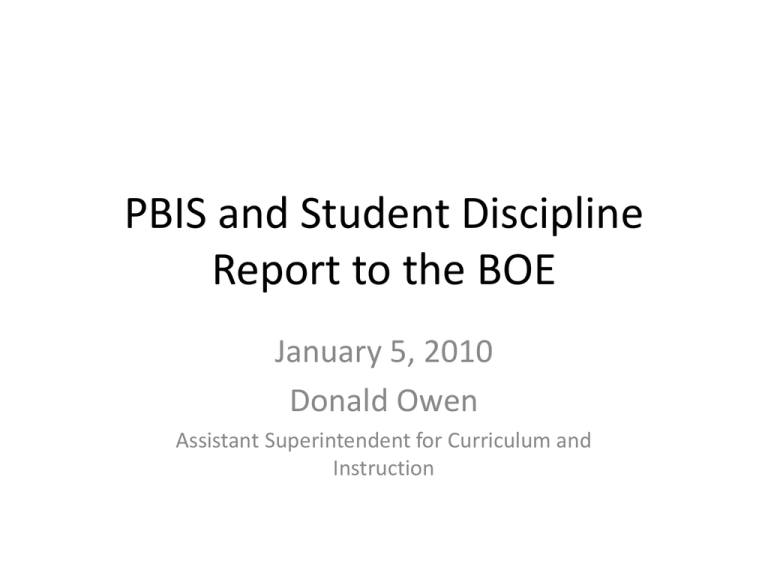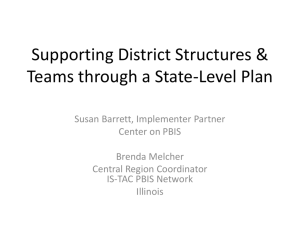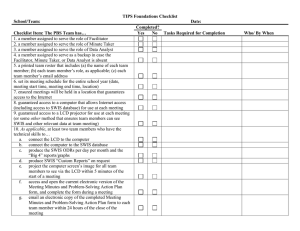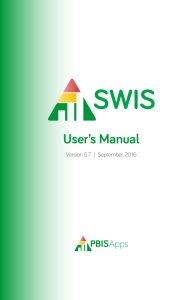PBIS/Discipline Presentation
advertisement

PBIS and Student Discipline Report to the BOE January 5, 2010 Donald Owen Assistant Superintendent for Curriculum and Instruction Overview of Presentation • District Collaborative Leadership Committee – Structure of Leadership Working Groups – Tertiary Replication Project • Discipline Data: – Types and Purpose of Data – Overview of District Discipline Data – Activities to improve school climate Mission of District Leadership Committee We will help all students by creating a multitiered, blended model of integration and support for academic, social, and emotional learning, and by working together through a data-based, problem-solving process. We will work with families and community partners to help us build and create a positive culture for learning. Blending Academic (RtI) and Behavioral (PBIS) Frameworks Structure for District Leadership Committee District Leadership Committee Data and Needs Assessment Working Group Collaborative Framework Working Group School/ Community/ Family Working Group Tier II/Tier III Working Group PBIS Tertiary Replication Project • PBIS – Positive Behavior Interventions and Supports (a framework for helping schools and districts create positive climates through data based decisions) • Tertiary Project – Providing supports and interventions for the students with the most complex behavioral needs. • USD116 as a Tertiary Replication Site: – King, Prairie, and Leal are participating this year in additional training to increase supports for Tier II and Tier III students – District is collaborating with wide network of Community Partners to share information and ideas to help support students and families – Goal is to expand and strengthen PBIS/RtI Collaborative model and Community Partnerships across the district over the next three years Looking at Data • Three levels of Data: – Strategic: Big picture – BOE, ISBE – Tactical: School/District Improvement Planning – Operational: Building/Teacher level that can inform practice • District Leadership Data Working Group will create guidelines about reporting of data to help support use of data at all three of these levels • District Administration is actively pursuing new tools and technologies to help strengthen operational data Discipline Data • State implemented new reporting procedures in fall of 2009 that require that district report all In and Out of School Suspensions by student to ISBE’s Student Information System (SIS) • District has been working with Skyward to improve discipline reporting on the Tactical and Operational levels of data. • In fall of 2009, all elementary schools began using SWIS (swis.org) to track discipline data to provide more Operational data for principals and teachers Discipline Data Continued • The Strategic Data is presented as a percentage (%) of enrollment by building or district because it provides a more accurate view of building climate than raw numbers • District administration looks at both Strategic and Tactical data to provide support, training, and interventions where needed Percentage of Students Who Received 1 or More OSS by Year by Elementary 10.0 9.0 8.0 7.0 6.0 2006-2007 2007-2008 5.0 2008-2009 4.0 2009-2010 Projected 3.0 2.0 1.0 0.0 King Leal Prairie Thomas Paine Wiley Yankee Ridge Percentage of Students Who Received 1 or More OSS by Year by Secondary 25.0 20.0 15.0 2006-2007 2007-2008 2008-2009 10.0 2009-2010 Projected 5.0 0.0 UMS UHS District Percentage of Students who have Received ISS & or OSS by Race Compared to Enrollment by Race as reported to ISBE for 2008-2009 100 90 80 70 60 50 % of District Enrollment 40 % of ISS & OSS 30 20 10 0 American Asian/Pacific Indian or Islander Alaska Native Black or African American Hispanic Multiracial White Number of Students Brought to BOE for Expulsion Hearings by School Year (All expulsions were stayed) 14 12 10 8 2006-2007 2007-2008 6 2008-2009 4 2 0 Total M F Black White Elemntary UMS UHS Examples of SWIS Reports Operational Data Examples of SWIS Reports Operational Data Examples of SWIS Reports Operational Data Examples of SWIS Reports Operational Data Supports and Next Steps • District and building leaders use Tactical and Operational data for District/School Improvement Planning and continuous improvement and intervention decisions – Collaborating with Safe Schools Alliance and UIUC experts, Dorothy Espelage and Philip Rodkin, for professional development about reducing bullying – Participating in the IL-PBIS Network to improve climate and system practices – Focus of district wide professional development is school climate and instructional supports Supports and Next Steps • District Administration is supporting new data tools – SWIS – Student achievement data warehouse • District Leadership Committee will recommend guidelines for data use and reporting




